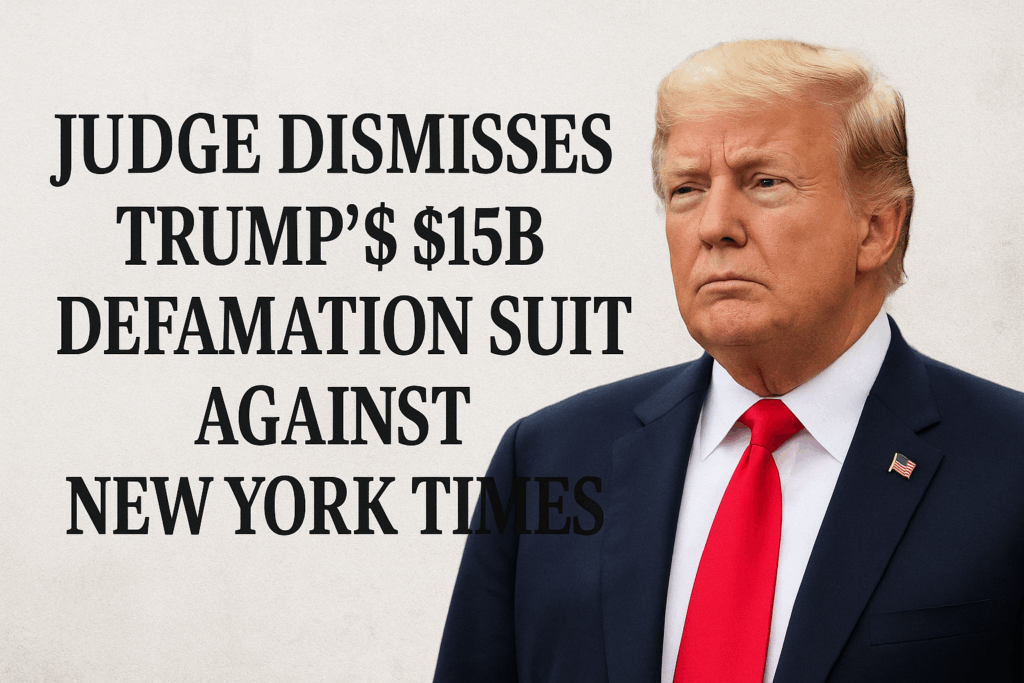A federal judge has dismissed Donald Trump’s $15 billion defamation lawsuit against The New York Times, several of its reporters, and publisher Penguin Random House, citing excessive political rhetoric and procedural flaws.
U.S. District Judge Steven D. Merryday of Florida’s Middle District issued the ruling four days after the complaint was filed. He gave Trump’s lawyers until mid-October to refile a “professional and dignified” complaint meeting federal civil procedure rules.
The lawsuit claimed that The New York Times and Penguin Random House attempted to harm Trump’s business reputation by publishing negative reports about his career. It sought $15 billion in damages, among Trump’s largest defamation claims.
Merryday, appointed by President George H.W. Bush, sharply criticized the filing’s structure and tone. He said the 85-page complaint included excessive detail, praising Trump’s achievements but offering little legal argument. Formal defamation counts appeared only at the end.
“Alleging only two simple counts of defamation, the complaint consumes eighty-five pages,” Merryday wrote. “Count I appears on page eighty, and Count II appears on page eighty-three. Even under the most generous and lenient application of Rule 8, the complaint is decidedly improper and impermissible.”
The judge stressed that federal rules require a “short and plain statement” of relevant facts. Instead, he found Trump’s filing read like a political manifesto, not a legal pleading. “A complaint is not a forum for invective,” Merryday added. He required that any revised filing not exceed 40 pages.
The case named four Times reporters—Peter Baker, Russ Buettner, Susanne Craig, and Michael Schmidt—as well as Penguin Random House, publisher of Lucky Loser: How Donald Trump Squandered His Father’s Fortune and Created the Illusion of Success by Craig and Buettner. Trump’s lawyers argued that the book and related reporting drove a campaign of falsehoods, damaging his reputation and political prospects.
A spokesperson for Trump’s legal team responded defiantly, saying, “President Trump will continue to hold the Fake News accountable through this powerhouse lawsuit against The New York Times, its reporters and Penguin Random House, in accordance with the judge’s direction on logistics.”
Representatives for The Times and Penguin Random House did not immediately respond to requests for comment. Both have previously defended their reporting and pledged to stand by their journalists and authors.
Legal experts note that even if Trump refiles, defamation suits against media organizations face high hurdles, especially from public figures. Under New York Times v. Sullivan, plaintiffs must prove not just falsity, but “actual malice”—that statements were knowingly false or made with reckless disregard for the truth.
Friday’s ruling highlights another challenge: the need for clarity and precision in pleadings. By filling the complaint with political grievances, Merryday implied, Trump’s lawyers endangered the viability of their own case.
The lawsuit is the latest in a series of legal battles Trump has waged against major media outlets. In July, he filed a $10 billion lawsuit against The Wall Street Journal over a report that linked him to a birthday tribute for financier Jeffrey Epstein. Trump has denied the allegations. That case remains pending.
Merryday’s order gives Trump another opportunity—this time limited to legal issues. If Trump’s lawyers fail to meet the judge’s requirements, the case could again be dismissed, potentially ending one of Trump’s most ambitious challenges to the press.


